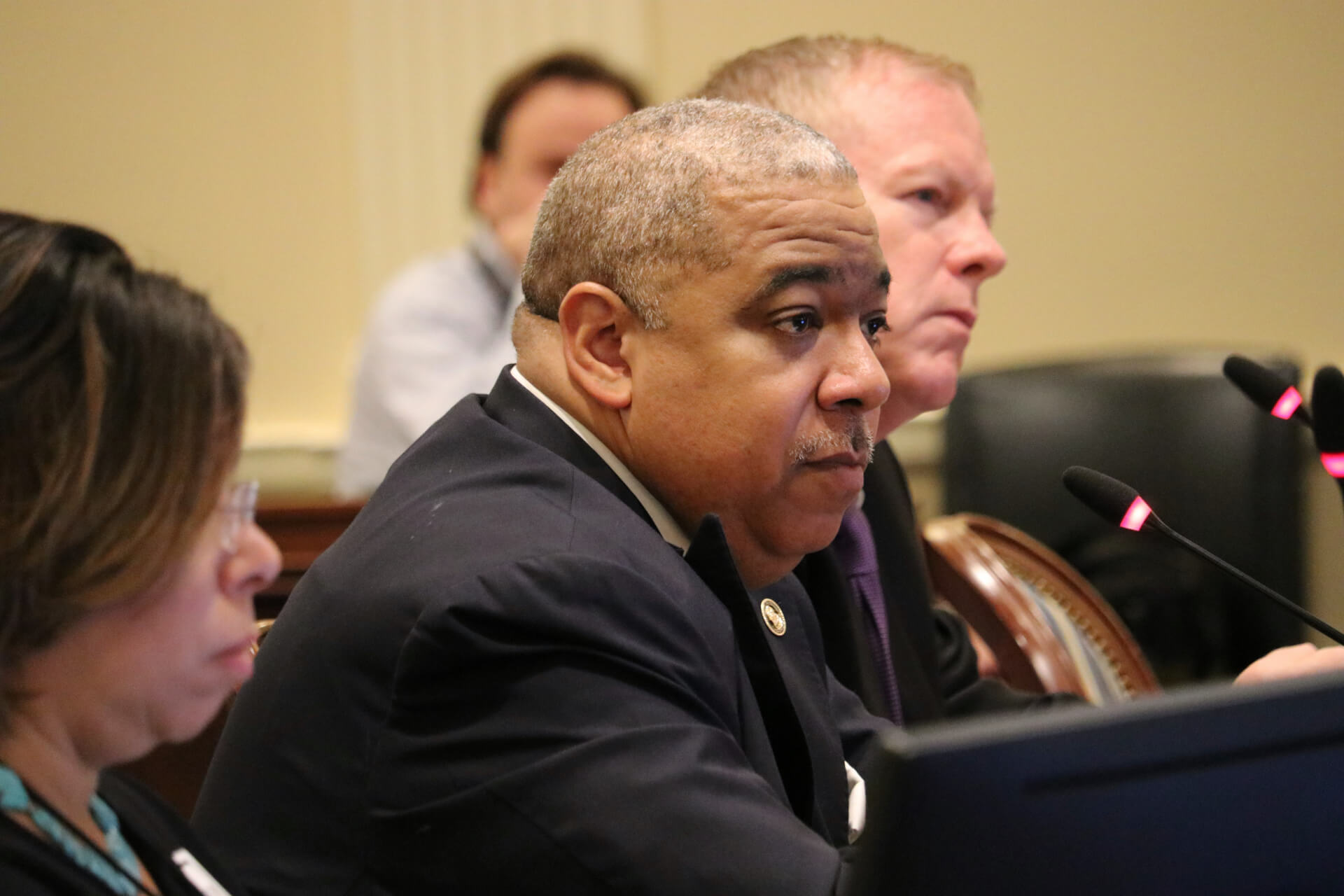Baltimore Commissioner Pressed on Lack of Internal Gun Trace Task Force Review

Baltimore Police Commissioner Michael Harrison said Tuesday his department has not yet undertaken a “deep dive” into the origins of a corrupt police unit that planted evidence, committed robberies, dealt drugs and laundered money.
Harrison was asked at an Annapolis meeting of the Commission to Restore Trust in Policing whether the department had started a review to uncover any “red flags” in the hiring and training of the nine Gun Trace Task Force members and other officers who were convicted and are serving federal prison sentences.
“Has the department done a review internally of those officers convicted in the GTTF case or under investigation, of what you missed, was there anything that was missed going back to hiring through the point of the case being uncovered?” Gary W. McLhinney, director of professional standards for the Maryland Department of Public Safety and Correctional Services, asked.
“The department has not done a full review of everything that transpired through the GTTF to inform us of its root causes,” Harrison responded.
When pressed, Harrison implied that ongoing investigations and civil litigation may be the reason.
“Without saying what I can’t say, there’s still some ongoing matters that are not yet resolved with GTTF,” Harrison told the panel. “Both administratively and … criminally.”
However, U.S. District Court Judge James K. Bredar, who is overseeing the consent decree process to reform the police department, has also been pressing for such an examination.
Baltimore City Solicitor Andre Davis expressed concern about how that process would move forward alongside other investigations, Harrison said.
Davis’ office has been “engulfed with litigation” about police practices, said Harrison, and uncovering and talking publicly about new details as they’re discovered could create more challenges for the city.
McLhinney said concerns about litigation shouldn’t hinder a self-examination.
“To me, that’s problematic,” he said. “…We have a much bigger issue here and you have a much bigger issue in dealing with the fallout from GTTF than concerns about possible litigation.”
Harrison, clarifying, said no one disagrees that an examination should be done, but concerns remain about the details.
In an interview after the meeting, Harrison said he didn’t know whether a probe will “definitely” occur and wouldn’t offer a timeline for knowing the answer.
“I just got here,” said Harrison, who took the helm of the department in February. “It’s one of those things where it’s a topic of discussion. We’ve already begun talking about it. The questions now are how and when and who. Those are questions we don’t have the answer to yet.”
Harrison said the biggest issue facing the department has been a historic lack of accountability and transparency. A big part of dealing with Gun Trace Task Force and other police misconduct fallout will be improving the department’s Public Integrity Bureau, which is now headed by Deputy Commissioner Brian Nadeau, who was a supervising FBI agent during that agency’s investigation of the GTTF.
The Public Integrity Bureau will be moving forward with an “early intervention system” to flag any concerning activities and is working to handle a backlog of internal affairs complaints, with a focus on retraining and disciplining officers when necessary, as opposed to extended administrative assignments.
Earlier this week, city officials moved forward to remove “gag orders” imposed as part of police brutality settlements. And on Tuesday, Davis and Mayor Bernard C. “Jack” Young (D) announced that approval of law settlements in police-involved litigation claims be now assigned to the non-routine agenda of the Board of Estimates, which means residents will be able to speak publicly about their claims.
About 90 officers are on administrative assignments currently, and the public integrity bureau has a backlog of about 1,600 cases, partly because complaints of any magnitude are currently sent to that office.
Harrison said the department is looking to remove minor infractions like arriving to work late back to supervisors to clear the backlog. The department is also discussing whether qualified civilian employees – such as retired police officials – could help with investigations, though the Law Enforcement Officers’ Bill of Rights limits parts of investigations to currently uniformed officers.
The department is also adding civilian employees to help with secretarial and other duties that are sometimes currently handled by officers. Of 62 civilian positions recently funded by the city government, 50 of the roles were already vacant. Harrison estimated that another 100 civilian employees are needed for the department to run optimally.
Harrison was in Annapolis to brief the commission about a comprehensive crime plan unveiled in July.
The plan includes recruiting and retraining officers, establishing regular police presences in “microzones” that attract a high volume of calls, improving technology, upgrading shabby police facilities, and collaborating with other parts of city government and nonprofits to reduce crime. Commission members said they were pleased with much of what’s in the plan, which also addresses the requirements of the federal consent decree.
“This is a very impressive document. …This is certainly progress,” said retired federal judge Alexander Williams Jr., who chairs the commission.




 Creative Commons Attribution
Creative Commons Attribution